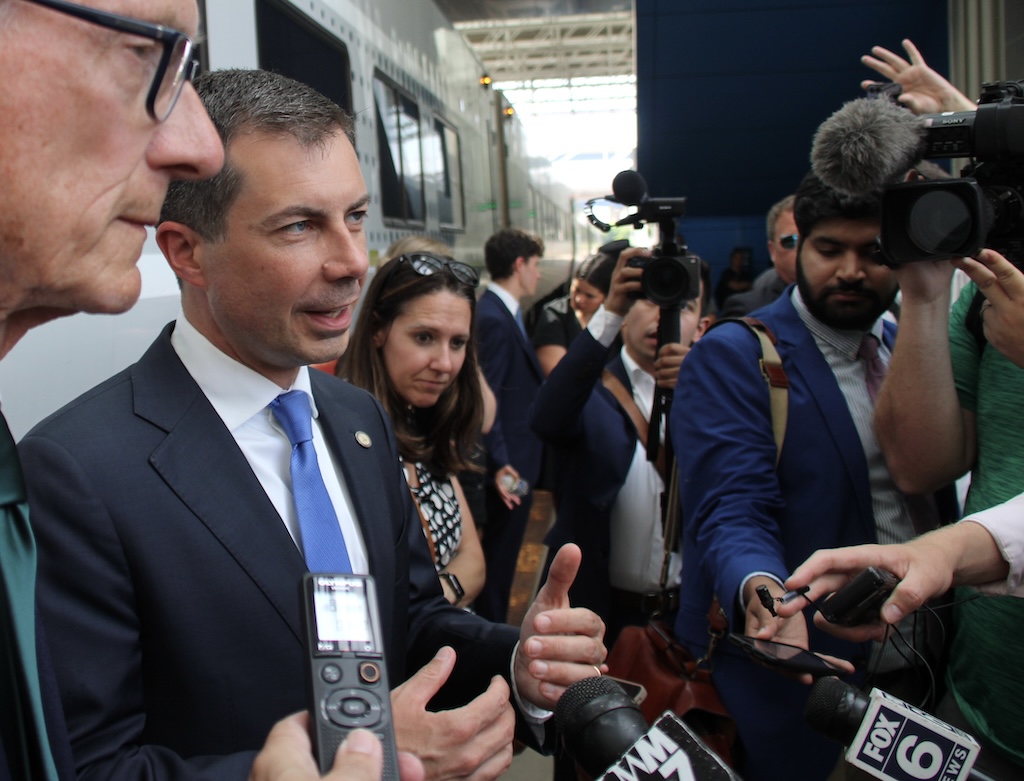
MILWAUKEE — The Justice Department needed to file a lawsuit against Norfolk Southern for its poor handling of Amtrak’s Crescent because Class I railroads routinely ignore the law that gives passenger trains preference over freight traffic, Transportation Secretary Pete Buttigieg told Trains on Wednesday.
The suit, filed Tuesday, July 30, in the U.S. District Court for the District of Columbia, is only the second time the Justice Department has sought to enforce the 1973 law that requires host railroads to give Amtrak trains preference.
A similar case, which Amtrak brought against Union Pacific in December 2022 over freight train interference with the Sunset Limited, is making its way through the Surface Transportation Board. It’s the first on-time performance dispute brought to the STB since the agency gained the authority to investigate violations of the federal Amtrak service standards that went into effect in 2020.
Why was the Crescent case brought through the Justice Department rather than the STB?
“I think you’re going to see an all-of-the-above strategy, because the bottom line is that we’ve got to get results. Federal law already requires Class I railroads to get out of the way when there’s a passenger train coming, and too often we see non-compliance that is a major source of delay and therefore frustration,” Buttigieg says.
Amtrak and passenger advocates have long maintained that unreliable service has been a barrier to growth in ridership. Freight train interference is the top cause of delays to Amtrak trains that operate on host railroads, Amtrak says.
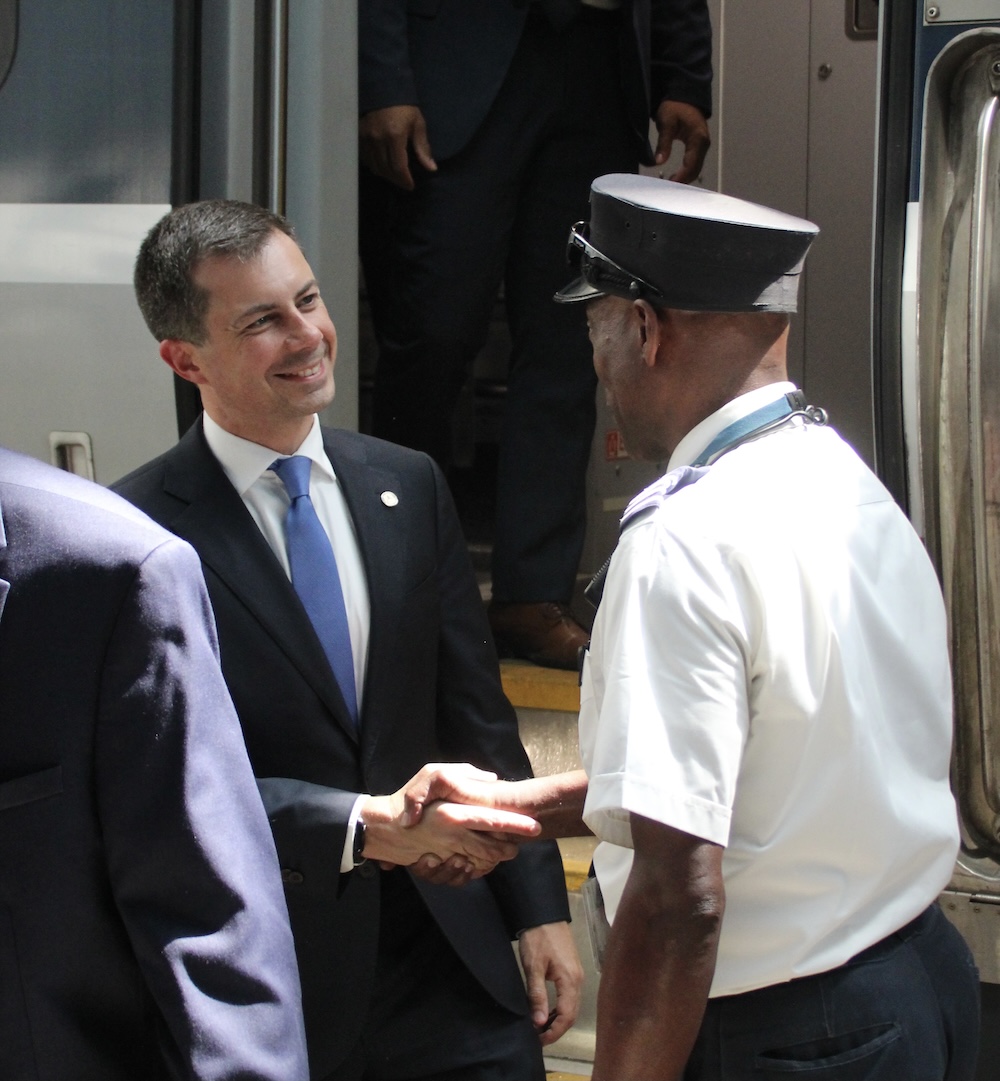
“Ridership would be higher if passengers knew they’d be able to get where they’re going on time, without having to worry about being blocked by freight rail. Ideally this would be fixed by freight railroads doing the right thing on their own,” Buttigieg says. “But short of that — and I’ve talked with the railroad CEOs myself about why they need to do that — STB, DOJ, and our own work as a department will all work in parallel to get results.”
Buttigieg says the public wants more — and more reliable — Amtrak service. “People want that service, but they also want and expect that service to be reliable. Many people don’t realize that sometimes when that Amtrak is running late, it’s through no fault of Amtrak. It’s because somebody has gotten in their way. That has to stop, and we will do everything we can to encourage it and enforce it until it does,” Buttigieg said on the station platform in Milwaukee with Wisconsin Gov. Tony Evers.
Amtrak, in a May letter, requested that the Justice Department take action. It was unclear why the lawsuit targets only Norfolk Southern and its handling of the Crescent. All 15 of Amtrak’s long-distance trains that operate on the Class I railroads failed to meet federal on-time performance standards last year, as did the vast majority of state-supported routes that operate on host railroads.
Last year 57% of Crescent passengers arrived on time, which was well below the 80% threshold required under federal standards. Six long-distance trains — the Silver Meteor (CSX), Empire Builder (BNSF, CPKC), Silver Star (CSX, NS), Sunset Limited (BNSF, UP), Southwest Chief (BNSF), and California Zephyr (BNSF, UP) — had worse on-time performance last year, according to Amtrak data.
Over the past 12 months, Canadian Pacific Kansas City and Canadian National were the only Class I systems to meet Amtrak’s goal of host responsible delay minutes per 10,000 train-miles, according to Amtrak’s latest Host Railroad Report.
An Amtrak spokeswoman did not respond to an email requesting information on the railroad’s decision to seek an enforcement action. Amtrak declined to release a copy of its letter to the Justice Department and referred questions to the Justice Department. A Justice Department spokeswoman declined to comment and said she was unable to provide a copy of the letter. Trains subsequently filed a freedom of information request with the Justice Department to obtain the letter and any related correspondence between Amtrak and Justice officials.
Some industry observers suspect that politics played a role in the decision to single out Norfolk Southern. Earlier this year the Justice Department faced criticism from lawmakers on Capitol Hill after it reached a settlement with NS regarding its hazardous materials derailment in East Palestine, Ohio — a decision made before the National Transportation Safety Board released its report on the wreck.
The industry observers said the suit against NS would show Justice Department critics that it was not soft on the railroad after all. And they said they were stunned that Attorney General Merrick Garland commented on the case when it was announced on Tuesday.
“Americans should not experience travel delays because rail carriers break the law. Our action today alleges that Norfolk Southern violates federal law by failing to give the legally required preference to Amtrak passenger trains over freight trains,” Garland said in a statement announcing the civil suit. “The Justice Department will continue to protect travelers by ensuring that rail carriers fulfill their legal obligations.”
The Justice Department has always had the authority to enforce Amtrak’s right of preference. But it has only filed a suit once before, against Southern Pacific in 1979 for its handling of the Sunset Limited. That case was ultimately dropped after service improved.
Amtrak, in a 2022 presentation, argued that the threat of preference enforcement has tended to improve on-time performance. Long-distance train on-time performance, which was below 50% when the Justice Department filed its complaint against Southern Pacific in 1979, jumped to above 60% in 1980 and ultimately peaked at above 80% four years later. More recently, the Sunset Limited’s performance has improved since Amtrak filed its STB complaint against UP.
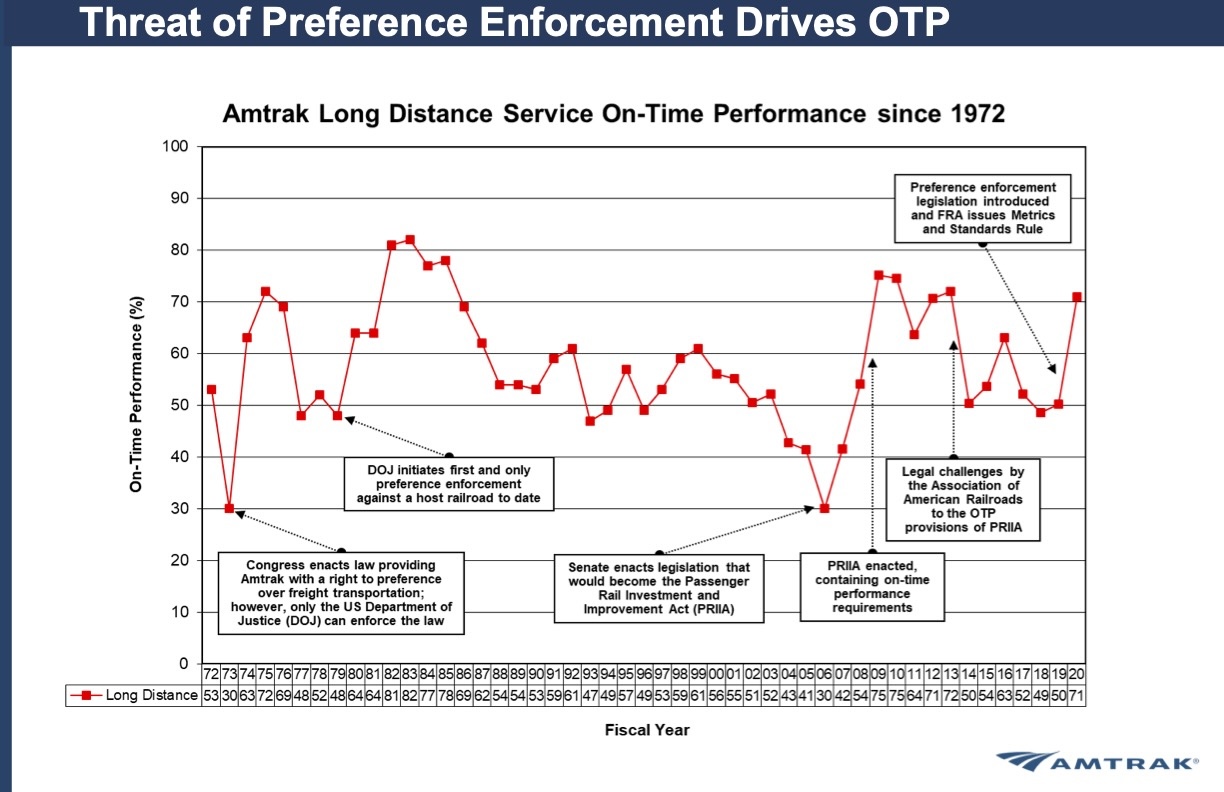
Jim Mathews, CEO of the Rail Passengers Association, said the right of preference lawsuit was long overdue.
“Unfortunately, Amtrak is entirely dependent on the DOJ for enforcement action of this right, which has only happened once before today, way back in 1979,” Mathews said in a statement. “That means tens of millions of American passengers have been waiting for decades for relief from these host railroad-caused delays. With that history in mind, Rail Passengers is extremely appreciative of the leadership shown by the Biden Administration, the DOJ, and the U.S. Department of Transportation for taking action to protect the legal rights of passengers to quality, on-time service.”
Substandard on-time performance can’t be explained by the impact of bad weather or supply chain disruptions affecting freight railroads, Mathews said, especially since passenger train schedules have been certified by host railroads and Amtrak.
— Trains Senior Editor David Lassen contributed to this report.








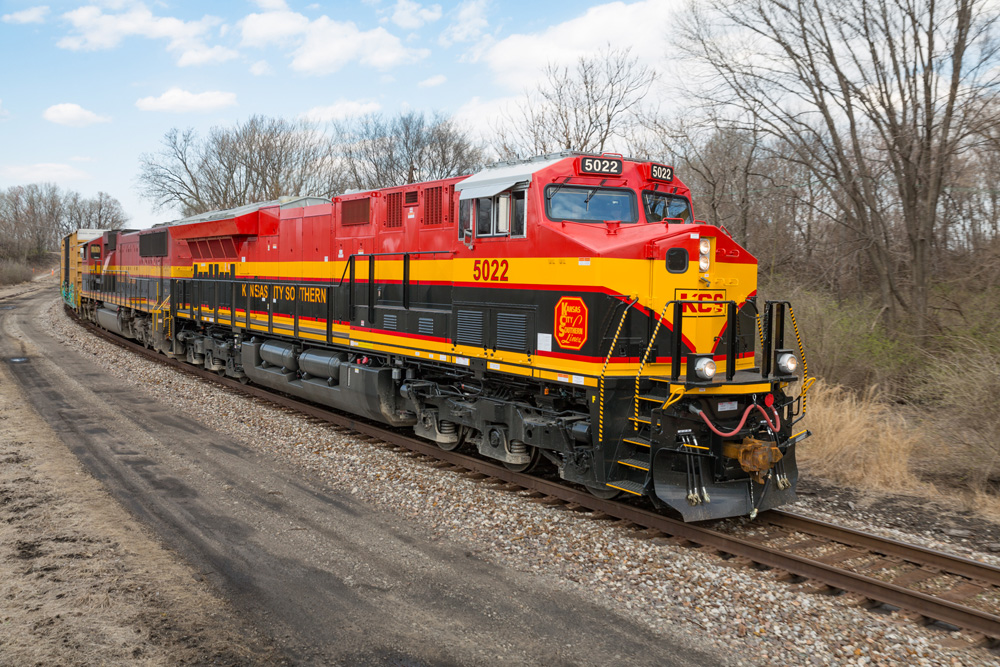
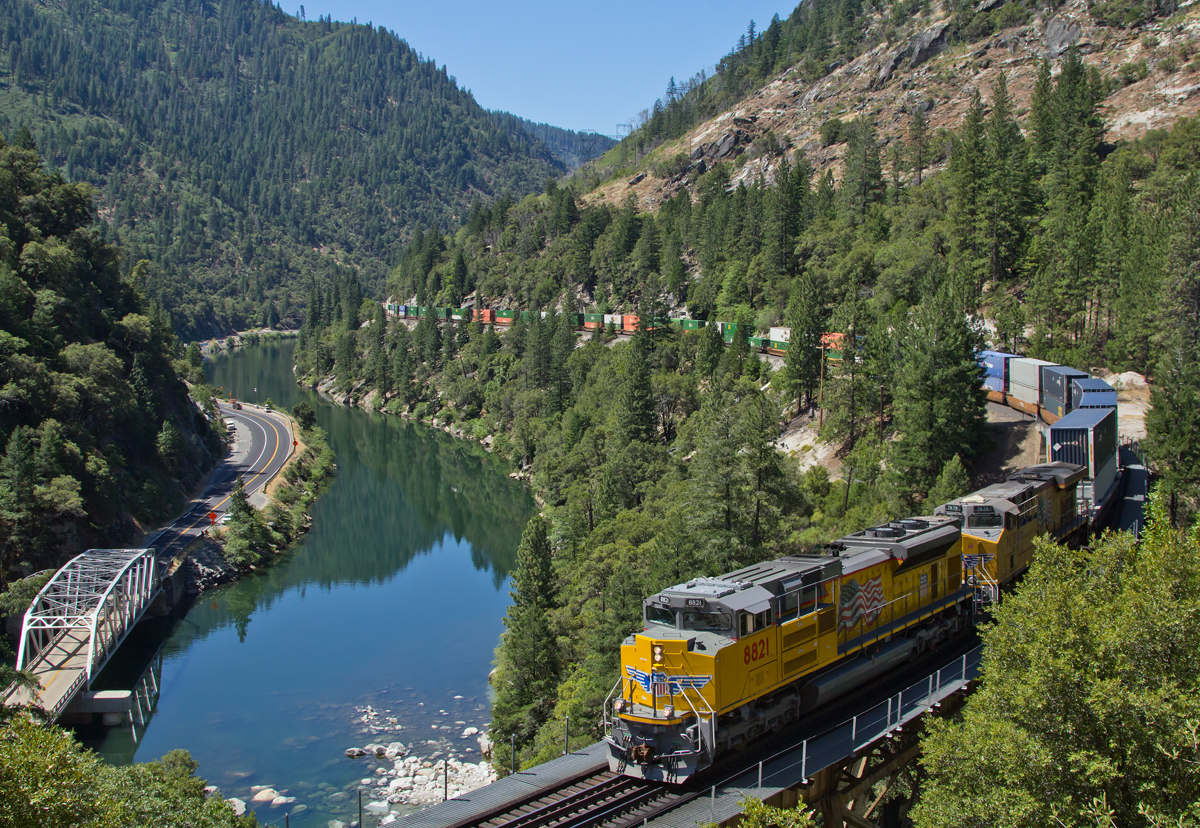




Many of you really seem to have a real issue with Pete B despite the fact that he has been more involved & visible with the issues of his Dept than any of his predecessors never heard a bad word on this site about Elaine Chao but then again she didn’t do anything except look out for her families shipping interests. Is it because Pete is Gay?
No, the comments on Mayor Pete don’t have to do with his “sexual orientation” (at least mine weren’t !), it has to do with the fact that he is terrible at his job and is basically incompetent.
I don’t know about Elaine Chao’s record as Transportation Secretary and at this point, her tenure is irrelevant. Pete Buttigieg is now USDOT Secretary of Transportation and is thus accountable for the federal government’s failings with respect to Amtrak (and other federal transportation policy).
Another thought /comment: I wonder if USDOT Transportation Secretary Pete Buttigieg (AKA “Mayor Pete”) could articulate, in detail, the status of the $66 Billion that the Biden Administration has pledged to Amtrak and how it will improve and expand Amtrak services.
Understand that not all of this federal funding has been obligated yet (it’s programmed out over a number of years) BUT, I suspect beyond his usual slick, platitudinous responses, I doubt Mayor Pete could articulate in detail how (and where and when) this sizable federal “investment” will make Amtrak a truly viable, 21st century national passenger rail network.
The sub-header in this article ” But some industry observers question why Norfolk Southern was singled out for its handling of the Crescent when no Amtrak long-distance train met on-time performance standards last year.” is also telling and raises some interesting questions. If “no Amtrak long-distance trains met” (their OT performance requirements ) last year…” one cannot but help wonder as to why this is. Understandably, there are probably a variety of reasons for this, but why isn’t the ‘Justice Department’ going after all of the Class Is in order to achieve an “all the above strategy” to get the results that ‘Mayor Pete’ claims? (Probably shouldn’t give the Justice Department any ideas …!).
Ridiculous! Amtrack is a parasite. Plain and simple. They should build their own ROW.
Remember the comment of an Amtrak conductor to a angry, vociferous, coach passenger who could not get a seat on a packed Amtrak “Water Level Route” train from NYC to Albany:
“Your ticket provides you transportation, not a seat”. The enraged passenger was consequently met by police at the next station stop and escorted off the train.
I would love to ask Mayor Pete how he traveled WAS-MKE. Anyone here think he rode #29 to CHI transferring to a Hiawatha or #7/27. Sure he did /s.
Yes, I’m guessing ‘Mayor Pete’ didn’t ride Amtrak from Washington D.C. to Milwaukee (he might have learned a thing or two about Amtrak if he did …).
But hey, ‘Mayor Pete’ is an “expert” on Amtrak since he rode it when he was in college ….(!)
When looking at Amtrak delay’s on non-Amtrak trackage, wonder what the percentage is between freight interference and Amtrak mechanical issues? When a passenger train leaves say Chicago 3 hours late due to “mechanical issues” you can’t ding the host railroad. Same with trains being turned over in DC heading south and being late. I suspect the mechanical aspect of these tardy trains is high, but I have no idea what the number is. I did hear Mayor Pete talking about freight interference on the radio today. Funny there was no mention of the current meltdown in Chicago because of Charger failures.
They seem to be always stepping in for airline psgrs “legal rights” this latest crowdstrike meltdown is a perfect example they (Transp Dept) are going after the airlines especially Delta for their slow recovery from the incident. They’ve stepped in regarding baggage fees, extra fees, etc, etc. As for the RR’s they’re happy to get Govt $$ for the projects to reduce bottleneck congestion in IL, squeezing dollars out of the Govt for tracks improvements not necessary to accommodate the new service in MS, $$ for the SW Chief route, the EB between Minot & Fargo, tracks in PA for expanding the Pennsylvanian, $$ for an additional MSP to CHI Borealis. Projects that save them money so their CEO’s & stockholders can pocket more money. Government policy should be no passenger service no taxpayer $$ pay for it yourself or be fed to the truckers!!
From the story:
“Rail Passengers is extremely appreciative of …….. for taking action to protect the legal rights of passengers to quality, on-time service.”
So now, among others, Americans have a RIGHT to on time transportation services? I must have missed that clause in the U.S. Constitution.
If they buy a ticket they have the right to get where they’re going under the terms of the contract of carriage.
If “you had to be in the clear for an hour before the train was due”, that’s simply crappy dispatching.
I was a railroad engineer that ran from Meridian, Ms to New Orleans, La., the same route as the Crescent. Pete Buttigieg knows as much about transportation as he does about making love to a woman. I have spent 4 to 5 hours in a siding, with a two million dollar freight train, waiting on the Crescent with about two dozen passengers, pass. NS did not delay the passenger train, you had to be in the clear for an hour before the train was due. Want to know why the supply chain is broken? Trains cannot get over the road because of the passenger train.
Kinda of an unnecessary swipe at Buttigieg’s sexual orientation. maybe leave that out next time.
Both Mr. Rice and Mr. Landey make valid points; there are multiple angles to this grandstanding by the DOT. (This theatrical event is not likely to soften attitudes toward Amtrak). One more point: rail transportation is unrecognizable compared to the 1971 era, save for the rails. Are we trying to make an antiquated concept fit where it was not purposed to fit? Is Amtrak a round peg/square hole conumdrum?
There is a repeated pattern here. Amtrak gave the SP and then the UP repeated retimings of the SUNSET, only to see it still fail to meet targets. This was the first route to see an Amtrak enforcement action back in the 1970s. Today with a much slower schedule things are a bit better LA-NOL, BUT—-
So in 2022 Amtrak gives NS over an hour added running time on the CRESCENT between DC and NOL. Among other consequences the northbound CRESCENT no longer offers a proper dusk to dawn overnight schedule between Atlanta and DC. This was one of the few places left in the country where a long haul still offered a useful schedule for travelers needing a full day the next AM for business. Things are a bit better now southwest of Atlanta, but frequent delays For insanely long PSR freights, still bite–particularly northbound, where a late CRESCENT is likely to depart Atlanta after midnight.
I suspect Amtrak picked this route as a test becuse they had been so cooperative with NS yet things only got marginally better.
The article does not mention the joint NS-FRA-Amtrak working group that collaboratively set the current Crescent schedule circa 2022, which was reported on in Trains Newswire several times. Since the current schedule was set with NS participation (departure time from New Orleans was revised later, additional recovery time was added in several terminals, Atlanta departure time northbound went from 8pm to midnight), perhaps this is the reason Amtrak moved on this case, since the freight carrier was part of the working group but apparently did not deliver OTP results commeasurate with the scheduling effort intent.
Ironic that ol’ Cheapy still runs old Milw. Rd. like the old days.
I favor repealing that law and make Amtrak pay the railroads for their open spots.
Now, if Amtrak really knew how to run trains, I might think differently.
The law might repeal itself if a court ruled it unconstitutional as a seizure of privately-owned assets without compensation. I could name two reasons why that won’t happen. (1) The railroads wouldn’t make that case because the nation would turn against them. (2) It would be a difficult or impossible case to make. The railroads are regulated semi-monopoly public utilities. Private ownership doesn’t mean they can do whatever they want against the public interest.
They’re always stepping in for whiny airline passengers good to see them finally advocating for rail passenger! It’s more than Elaine Chao ever did!!
A typical legal strategy is to file suit against the weakest or most pliable entity to either win outright or get some sort of plea arrangement that they can use against the others.
Hey Mayor Pete, fair is fair. While you dump on the private sector (with good reason), also criticize Amtrak for its own failures. Under your watch, Mayor Pete.
Excellent point! Of course, since there’s no accountability in the federal government, Mayor Pete will not criticize Amtrak for its shortcomings/failures, nor for his own …..